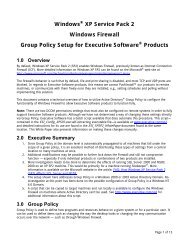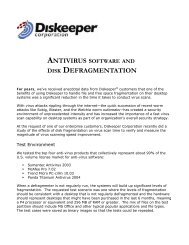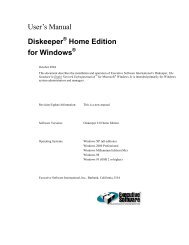Diskeeper 10 User's Manual
Diskeeper 10 User's Manual
Diskeeper 10 User's Manual
You also want an ePaper? Increase the reach of your titles
YUMPU automatically turns print PDFs into web optimized ePapers that Google loves.
52 <strong>Diskeeper</strong> Operation<br />
file on the volume that was defragmented (if it exists on the volume). This appears in the Windows Event<br />
Viewer as <strong>Diskeeper</strong> Event 17. This option is not enabled by default.<br />
On Windows 98/Me: When this option is enabled, an entry is made in the <strong>Diskeeper</strong> EventLog.txt file<br />
containing information as described above. This option is not enabled by default.<br />
For a description of information contained in the Description box, see page 22.<br />
Directory information<br />
On Windows NT, Windows 2000, Windows XP, and Windows Server 2003: When this option is enabled,<br />
an entry is made to the Event Log at the end of each defragmentation run showing information about the<br />
directories on the volume that was defragmented. This appears in the Windows Event Viewer as <strong>Diskeeper</strong><br />
Event 18. This option is not enabled by default.<br />
On Windows 98/Me: When this option is enabled, an entry is made in the <strong>Diskeeper</strong> EventLog.txt file<br />
containing information as described above. This option is not enabled by default.<br />
For a description of information contained in the Description box, see page 22.<br />
MFT information<br />
On Windows NT, Windows 2000, Windows XP, and Windows Server 2003: When this option is enabled,<br />
an entry is made to the Event Log at the end of each defragmentation run showing information about the Master<br />
File Table (MFT) on the volume that was defragmented. (Keep in mind, since only NTFS volumes have an<br />
MFT, this information will only apply to NTFS volumes.) The entry appears in the Windows Event Viewer as<br />
<strong>Diskeeper</strong> Event 19. This option is not enabled by default.<br />
This option does not exist on Windows 98/Me machines, as MFT files are unique to Windows NT through<br />
Windows Server 2003.<br />
For a description of information contained in the Description box, see page 22.<br />
Display Behaviors<br />
Click <strong>Diskeeper</strong> Configuration Properties in the <strong>Diskeeper</strong> toolbar or the Configure <strong>Diskeeper</strong> task<br />
group in the Quick Launch pane, then select the Display Behaviors option to control the following option:<br />
TVE Display<br />
Enable this option to have <strong>Diskeeper</strong> display “before and after” volume maps when defragmenting volumes<br />
with the Terabyte Volume Engine (TVE). Because of the additional system overhead required to gather and<br />
display the volume map information, enabling this display can significantly increase the time required to<br />
complete a defragmentation job. (Note this option is only available in <strong>Diskeeper</strong> editions that support the TVE.)<br />
Power Management<br />
Click <strong>Diskeeper</strong> Configuration Properties in the <strong>Diskeeper</strong> toolbar or the Configure <strong>Diskeeper</strong> task<br />
group in the Quick Launch pane, then select the Power Management option to control the how <strong>Diskeeper</strong><br />
operates on computers running on battery power.<br />
When this option is enabled and the computer is running on battery power, any scheduled defragmentation jobs<br />
are postponed, and a message noting this is written to the Windows Application Event Log. If you start a<br />
<strong>Manual</strong> Defragmentation Job when this option is enabled (and the computer is running on battery power), a<br />
message is displayed asking if you want to continue, even though running <strong>Diskeeper</strong> on battery power may<br />
reduce the available battery time.<br />
When this option is enabled and the computer switches from normal power to battery power, any ongoing<br />
scheduled analysis or defragmentation jobs are safely stopped and a message noting this is written to the






